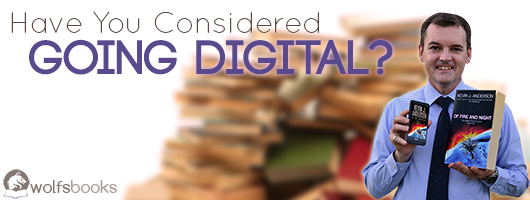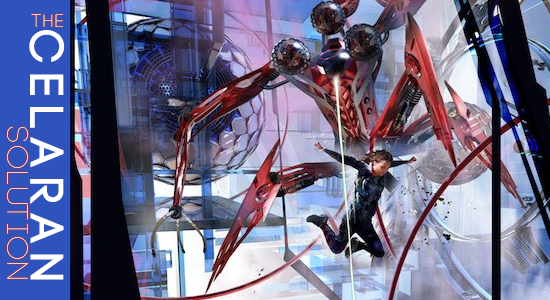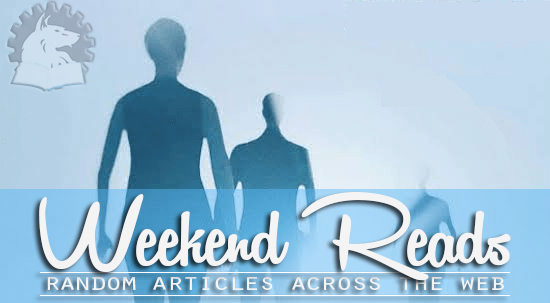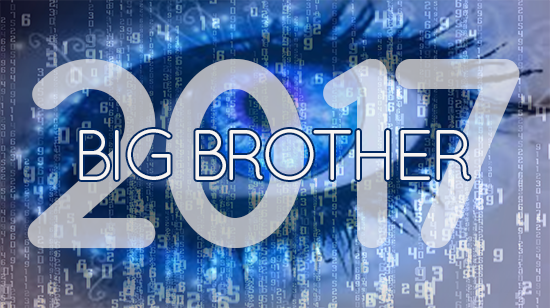Have You Considered 'Going Digital' With Your Reading?
Do you still read 'real' books or have you moved across to digital e-books? While I still love my physical books and proudly display them in every room of my home, most of my reading lately is done with the help of some sort of electronic device.
I've found that migrating to the digital platform has had many advantages for me, the biggest being convenience. If you are considering going digital then read on. I will take you through a few of the advantages that I have experienced by going digital in my reading, and then we can look at some of the drawbacks or disadvantages that I see with taking this path.
Convenience
As I've already mentioned convenience is the biggest one for me. There are many ways to read an e-book, you can use a dedicated reader, like the Amazon Kindle or Kobo e-ink readers, or you can download an app to use on your tablets, Personal Computers (PC’s) and smart phones. I started my journey toward digital reading with a Kobo e-ink reader, it was lighter and thinner than most books, so I preferred carrying it around than I did a book.
I still treated it like as would a book, so there were places I didn't take it, like shopping with my wife. Then I bought a smart phone, and with the help of a free e-reader app (program), I had a collection of books in my pocket. Research conducted in 2012 by the Morgan Stanley group found that 91% of adults have their mobile phone within arm’s reach 24/7, and I have to admit to being part of that 91%. Because I always have my smart phone on me or within arm’s reach, having an e-reading app loaded on it makes it very convenient for me to read whenever I want to. Now if I go shopping with my wife and I'm waiting for her to reappear from the change rooms, I have the option of whipping out my phone and continue reading from where I left off last time, whether that was in bed the night before, while waiting for my order in the coffee shop or from the waiting room of the barbers shop. It's one less item to carry with you and you have your books with you as long as you have your mobile device.
I have outlined my migration to e-reading previously on this blog:
Here, E-books Keep-em Together;
here, Black Kobo 4 Years On;
and here, Black Kobo.
Print size
Another advantage is that you are able to make the words bigger so you that you don't need to purchase the large print edition.
Environmental
Other articles on the web promoting the advantages of 'going digital' often mention that it is an environmentally friendly option and that purchasing e-books save trees and lower environmental impact. I would disagree with this and my options on this could be the topic of another post. (add link to future post here).
Instant purchases
Overall, the reason I have gone digital with my reading is that it's convenient, I can have a library of books with me where ever I go and I can purchase e-books anytime of the day. For example, if I am reading a great series, and I want to continue on reading other books within that series, at 1am in the morning, I can purchase the next book directly from the online store and be reading within 5 minutes of completing the last book. Convenient huh? no need to wait until the shop opens the next morning.
There are some disadvantages to 'going digital' as well.
Initial costFirst up is the initial cost of getting started. You will need a device like a dedicated e-reader, a tablet (iPad) or mobile phone, these are all very expensive. I was able to purchase a Kobo e-ink e-reader because I had been given some money for my birthday. I have read this device to breaking point and have considered replacing it with a new Kobo e-ink e-reader, however my budget will not stretch far enough to do so. However I do miss reading on the e-ink screen.
Screens
Speaking of e-ink screens, it is only certain e-readers whose screen have this paper like facsimile screen, the rest of our electronic devices use LED screens which are not very easy to read in full sunlight or in a room with high levels of light.
Environmental
Real books don't need to be charged up, and the process of creating that energy needed to power the device as well as the resources needed to build the e-reader devices could be considered very unfriendly to the environment.
Nostalgia
A lot of people, myself included, love the smell and feel of real books which is not provided by an e-reader.
Study
When it comes to linear reading, like a novel, or starting from chapter one and reading consecutively until you finish at the end of the book, an e-book is perfect, but not so much for research or reading reference books. With books like text books or Bible commentaries where you are jumping from one section to another, I find it a lot easier to use a physical book for this purpose. E-readers don't multitask very well, so it's very difficult to jump between several e-books on the one e-reader. You would need several e-readers (or tablets or PC's) spread around your desk with a different reference book open on each, which may work if you can share the e-books between your electronic devices or have enough devices to do this with (another disadvantage of e-book).
Loaning or borrowing e-books.
I find it difficult to loan out e-books. If I've read a book that I think a friend may be interested in, I am unable to pass it on. The existence of DRM (Digital Rights Management) normally attached to the e-book file makes it very difficult for the file to be read on another unauthorised device. So unless you are willing to hand over your e-reader (which this guy did) loaning or borrowing e-books are difficult to nigh on impossible.
I am aware that libraries are using some type of technology where you can 'check out' an e-book (link) which will then disappear from your e-reader upon the expiry date, and Kindle allows this to a certain extent. But this is moot if your friend doesn't have an e-reader.
Transient nature
Finally one feature which most people who own an e-reader and purchase e-books are unaware of is the transient nature of e-books.
Currently e-books have an unreliable life span. Paper books last for decades provided they are well cared for. And besides, what good is a bookshelf if you cannot enjoy the look and smell of all your time-worn books, lovingly thumbed, crimped and read cover to cover, over and over again? (source)
E-books are licensed to an individual reader, and not owned “Publishers can, and have, removed content, or modified e-book content,” I discuss this more along with DRM issues, in one of my earlier posts Let’s Talk DRM.
So have you considered going digital? I have, and from my experience it is convenience verses cost, transient verses permanence and keeping verses sharing. Ultimately you will need to weigh up the advantages and disadvantages and make up your own mind, but I hope I have helped somewhat with your decision to 'go digital'.
Thanks for getting to the end. I have a companion video to this post on YouTube.
Video: Have You Considered 'Going Digital' With Your Reading? | Discussion
Please feel free to leave comments in the YouTube channel.
Please feel free to leave comments in the YouTube channel.










Comments
Post a Comment
Feedback is welcome.